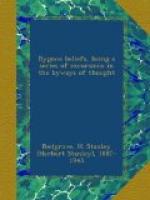[2] Ibid., p. 217; cf. p. 236
is made of both the Seeds, Male and Female, so by our artifice, an artificial and like conjunction is made of Agents and Patients."[1] “All teaching,” says KELLY, “that changes Mercury is false and vain, for this is the original sperm of metals, and its moisture must not be dried up, for otherwise it will not dissolve,"[2] and quotes ARNOLD (ob. c. 1310) to a similar effect.[3] One wonders how far the fact that human and animal seed is fluid influenced the alchemists in their choice of mercury, the only metal liquid at ordinary temperatures, as the seed of the metals. There are, indeed, other good reasons for this choice, but that this idea played some part in it, and, at least, was present at the back of the alchemists’ minds, I have little doubt.
The most philosophic account of metallic seed is that, perhaps, of the mysterious adept “EIRENAEUS PHILALETHES,” who distinguishes between it and mercury in a rather interesting manner. He writes: “Seed is the means of generic propagation given to all perfect things here below; it is the perfection of each body; and anybody that has no seed must be regarded as imperfect. Hence there can be no doubt that there is such a thing as metallic seed.... All metallic seed is the seed of gold; for gold is the intention of Nature in regard to all metals. If the base metals are not gold, it is only through some accidental hindrance; they are-all potentially gold. But, of course, this seed of gold is most easily obtainable from well-matured gold itself.... Remember that I am now speaking of metallic seed, and not of Mercury.... The seed of metals is hidden out of sight still more completely than that of animals; nevertheless, it is within the compass of our Art to extract it. The seed of animals and vegetables is something separate, and may be cut out, or otherwise separately exhibited; but metallic seed is diffused throughout the metal, and contained in all its smallest parts; neither can it be discerned from its body: its extraction is therefore a task which may well tax the ingenuity of the most experienced philosopher; the virtues of the whole metal have to be intensified, so as to convert it into the sperm of our seed, which, by circulation, receives the virtues of superiors and inferiors, then next becomes wholly form, or heavenly virtue, which can communicate this to others related to it by homogeneity of matter. . . . The place in which the seed resides is—approximately speaking—water; for, to speak properly and exactly, the seed is the smallest part of the metal, and is invisible; but as this invisible presence is diffused throughout the water of its kind, and exerts its virtue therein, nothing being visible to the eye but water, we are left to conclude from rational induction that this inward agent (which is, properly speaking, the seed) is really there. Hence we call the whole of the water seed, just as we call the whole of the grain seed, though the germ of life is only a smallest particle of the grain."[1b]




